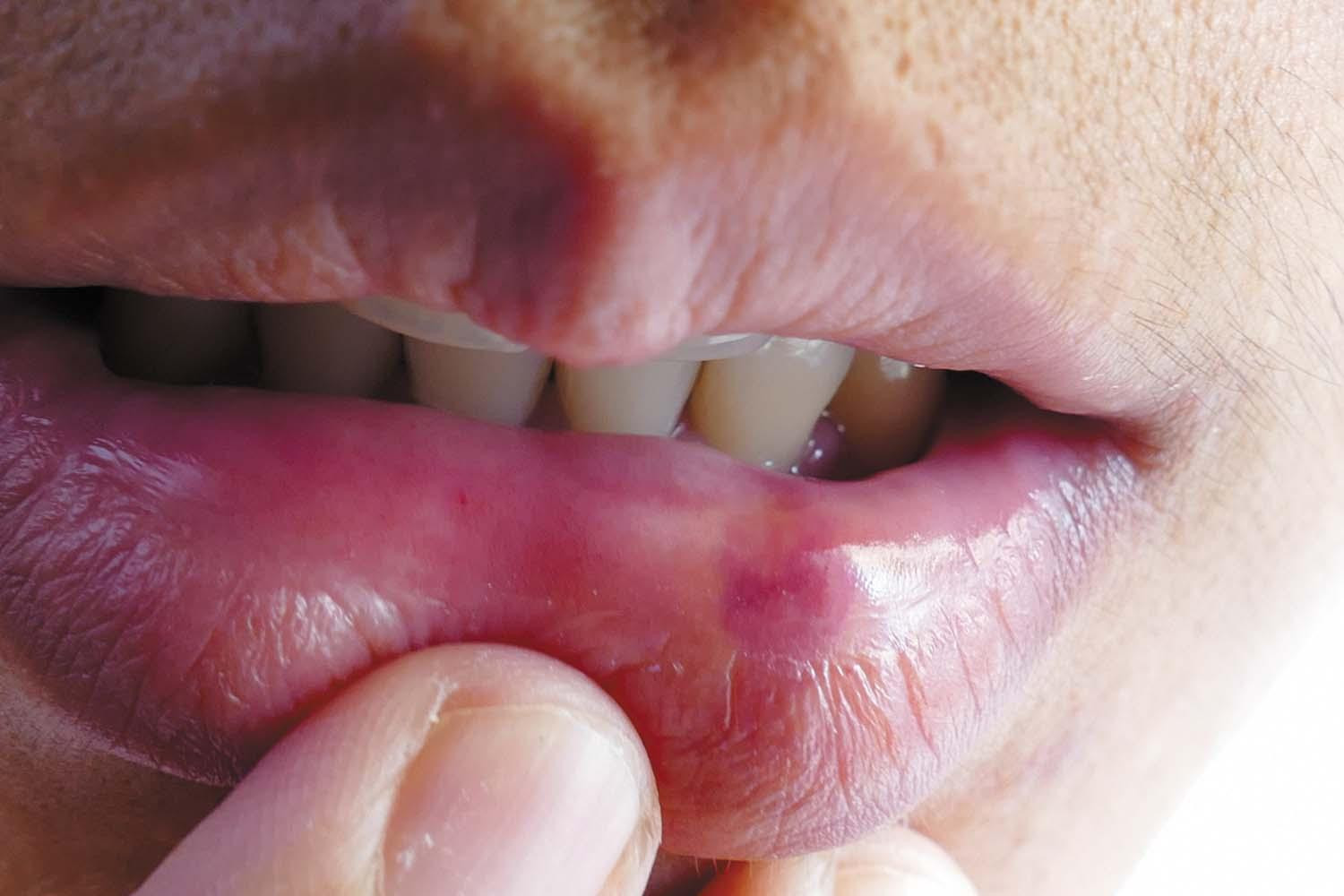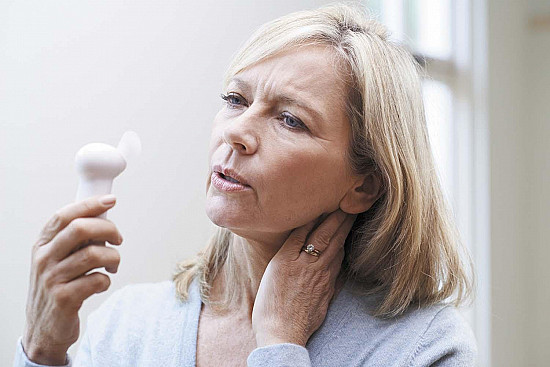Burning mouth syndrome: The scorching reality
This invisible disorder disproportionately affects women, but science is still teasing apart why.
- Reviewed by Toni Golen, MD, Editor in Chief, Harvard Women's Health Watch; Editorial Advisory Board Member, Harvard Health Publishing; Contributor

After reaching menopause, Marlene started noticing odd sensations in her lips. At first, they felt as if they were sunburned — raw and tingling — until sharp, stabbing pains began to pierce through the burn. Drinking wine or eating spicy foods added to the distress, and Marlene now keeps lip balm close at hand to continually dab on for brief relief.
Aptly named burning mouth syndrome, the condition affects about 2% of people, with women up to seven times more likely than men to be diagnosed — especially during the transition to menopause, according to the American Academy of Oral Medicine.
But it doesn’t necessarily involve only the lips. Burning mouth syndrome can also affect the tongue, roof of the mouth, gums, inner cheeks, and throat. As in Marlene’s case, burning pain can be joined by jabbing, tingling, a sour or metallic taste, or the sense that something’s crawling inside the mouth.
One thing tends to unite everyone with burning mouth syndrome, however: they feel alone. “Many of my patients ask, 'Who else has this?’ But there are so many others like them,” says Dr. Piamkamon Vacharotayangul, an oral medicine specialist in the Division of Oral Medicine and Dentistry at Harvard-affiliated Brigham and Women’s Hospital. “For those with a severe case, their pain is constant — they’re bothered by it all the time.”
Risk factors
Burning mouth syndrome is believed to be a form of neuropathic pain, meaning nerve fibers act abnormally and transmit pain despite no obvious trigger. But while it’s clear that hormone dips during perimenopause and beyond play a prominent role in women developing the disorder, scientists don’t yet know why. Compounding the mystery, hormone therapy doesn’t usually make a dent in symptoms.
But stress appears to be a factor. Dr. Vacharotayangul noticed this during the pandemic, when people of all ages and genders came to her clinic with newly emerging cases. Traumatic events such as job loss or the death of a loved one may also contribute. And people with burning mouth also suffer disproportionately from mood disorders such as anxiety or depression, she says.
Others may also be coping with conditions such as temporomandibular joint (TMJ) problems, chronic fatigue syndrome, or pain syndromes such as fibromyalgia.
“Burning mouth syndrome seems strongly related to stress and anxiety,” says Dr. Vacharotayangul. “And although it’s not always well recognized, hormonal changes in women can be very difficult to go through. It could be the cherry on top of everything else going on.”
Finding relief
Adding to the conundrum, there’s no diagnostic test for burning mouth syndrome. Doctors must first rule out other potential causes for symptoms, including yeast infections in the mouth, which can also cause burning; an inflammatory condition called lichen planus, which can involve painful mouth sores; or dry mouth, which can stem from medication use or other reasons.
The trial-and-error approach continues even after burning mouth syndrome is confirmed. There’s no cure and no standard approach to treatment, but a variety of medications and nondrug measures can help.
Dr. Vacharotayangul’s first-line choice is typically easy to find: alpha-lipoic acid supplements, which can help normalize nerve signals. She recommends taking 300 milligrams twice a day.
Another simple approach involves rinsing with tabasco sauce dissolved in water, which taps the ability of capsaicin — the active component in chili peppers — to counteract burning mouth syndrome with another type of burning sensation. “It helps by dispersing molecules in the mouth that are used by nerves to create pain,” she explains.
A mouth rinse containing clonazepam (Klonopin), a benzodiazepine typically used for anxiety or seizures, may also be effective. The drug needs to be prescribed cautiously, however. “The age of the patient is a consideration,” she notes, “since it can increase the risk of cognitive impairment and falls in older people.”
Doctors may also tap other nerve pain remedies such as gabapentin (Neurontin) or the antidepressant amitriptyline. And like Marlene, people with burning mouth may find temporary relief from topical creams or ointments, numbing products, or mouth rinses. Some also sip on cool water or suck on ice chips.
Stress management techniques such as mindfulness meditation and deep breathing are also worthwhile. “Two minutes of long, deep breathing has been shown to calm your system and can be very helpful,” Dr. Vacharotayangul says.
Image: © psisa/Getty Images
About the Author

Maureen Salamon, Executive Editor, Harvard Women's Health Watch
About the Reviewer

Toni Golen, MD, Editor in Chief, Harvard Women's Health Watch; Editorial Advisory Board Member, Harvard Health Publishing; Contributor
Disclaimer:
As a service to our readers, Harvard Health Publishing provides access to our library of archived content. Please note the date of last review or update on all articles.
No content on this site, regardless of date, should ever be used as a substitute for direct medical advice from your doctor or other qualified clinician.
















